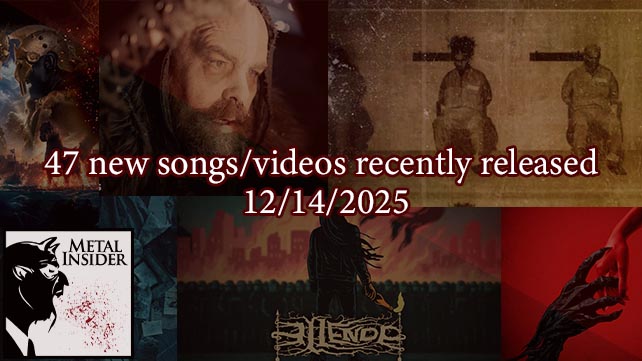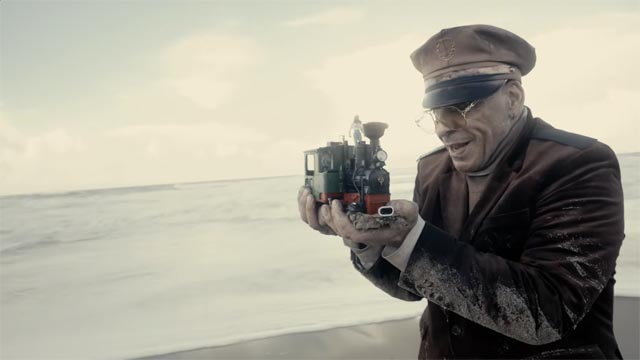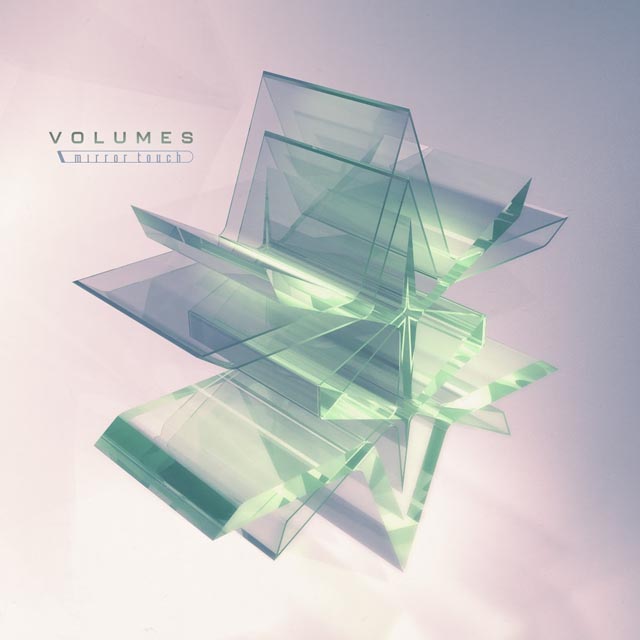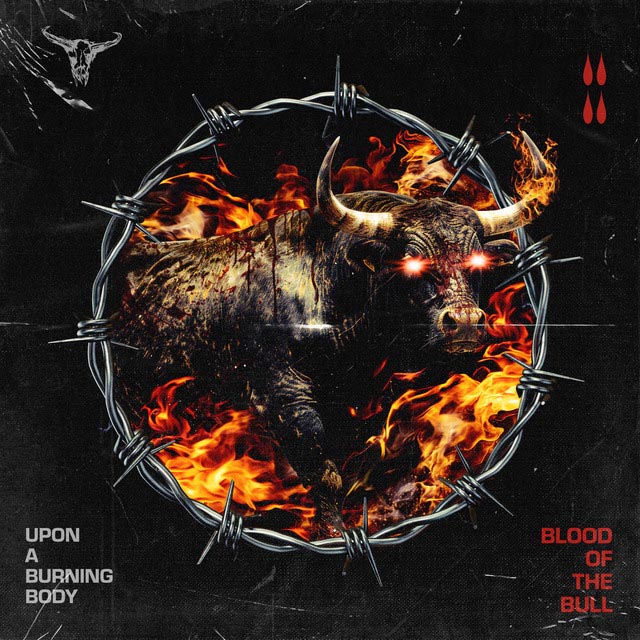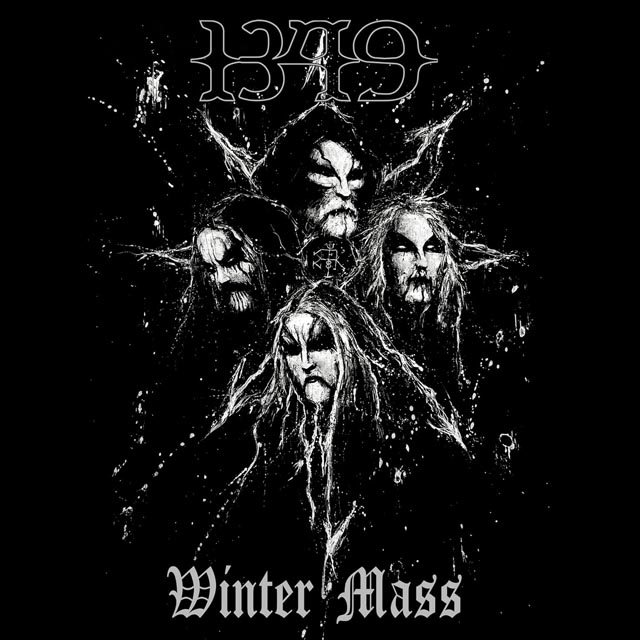 Formed in 1986 in New York City, Prong started out as a thrash band before evolving into one of the godfathers of modern groove and industrial metal. Hugely influential with milestones such as Beg to Differ and The Cleansing to its name, Prong isn’t resting easy; even though new album Carved Into Stone is their 9th album of originals, it’s one of the band’s thrashiest records in years. Carved Into Stone releases April 24 on Long Branch; you can stream opening track “Eternal Heat” here.
Formed in 1986 in New York City, Prong started out as a thrash band before evolving into one of the godfathers of modern groove and industrial metal. Hugely influential with milestones such as Beg to Differ and The Cleansing to its name, Prong isn’t resting easy; even though new album Carved Into Stone is their 9th album of originals, it’s one of the band’s thrashiest records in years. Carved Into Stone releases April 24 on Long Branch; you can stream opening track “Eternal Heat” here.
Metal Insider caught up with singer/guitarist Tommy Victor to talk about the new record, his thoughts on being a hired gun for Ministry and Danzig, and the possibility that he’ll be explaining “Snap Your Fingers, Snap Your Neck” to his grandchildren one day.
[audio:https://metalinsider.net/wp-content/uploads/2012/03/01-Eternal-Heat.mp3|titles=”Eternal Heat” by Prong, exclusive stream by MetalInsider.net]
You’re about to release Carved Into Stone, and it’s a very intense album. Where did all the energy come from when you were writing and recording that?
Just some inner will of some sort, maybe some outside power indicating a song carved into stone. It’s like there’s some power source from beyond that wants Prong to still survive that implements its energy from the future and zaps here on Planet Earth to keep this thing going. I have no idea otherwise. You have to work at regenerating energy. It takes work from a personal standpoint, so I did it. If I had to do it again, I’d probably say, “Fuck it,” pardon the language!
What was the process like behind the studio sessions? It sounds like you channeled something extra here.
I like that word, “channeling,” that’s good. The process was two years prior to actually going into the studio. It began with some computer stuff I worked on, some demos I made, and I started putting together some songs. Maybe one little piece of the initial six songs made it to the batch of 25 that were written over that period with Tony Campos, Alexei [Rodriguez] and Mike Doling (from Soulfly). A lot of demos, a lot of lyrics written, a lot of riffs, and a lot of complete songs were thrown in the garbage can. It’s just a process of elimination over that period until we finally get into pre-production right before we get in the studio. [Producer] Steve Evetts dialed some new parts in at the last minute, got rid of some boring ones and came up with the final 11 to do the basic tracks with. Then everything was played completely, precisely on the record. No cutting in pasting, not a hell of a lot of utilization of Pro Tools, no Melodyne or auto-tune. Just did it like we did back in the 90s.
So it was a little more live then. Was it all of you in a room playing together on each track, or was there more isolation?
For the basic tracks you do that mainly to cut the drums. Very little with any record is preserved from those initial tracks. You get the drums down and you do the overdubs afterwards, but that’s how most records are always done. I really don’t know anybody, except for maybe Pearl Jam, who goes in and records a whole record with everybody there. It was getting those hard, intense drum tracks really performed properly and then building on that.
I think that’s part of why it feels like it’s the closest record of the last couple to feel like Prong at its thrashiest. Is that industrial and dance kind of vibe that you jump back and forth from still a focus for you? Your last release was Power of the Damn Mixxxer, from 2009, and that was top-to-bottom remixes.
Yeah, those were remixes based on Power of the Damager, and to be honest with you, I wasn’t so unbelievably excited about doing a remix record at that point because when Prong first initially started doing those, not many other people were doing it. Now, it’s sort of a hackneyed concept. I just think that when Prong first started doing those more straightforward simplistic beats, it was more groundbreaking back then. It’s been done so much since it was initially done in the late 90s.
There are some tracks on the new record that have a little bit of that throwback to that initial concept, but I just think the songs are more important than anything. We dialed in the best songs we could possibly do, and if none of the songs with that industrial side to it were any good, we wouldn’t have used them. It wasn’t at the forefront of any concept behind it or anything. It was just about the best songs we could come up with. If they had more of that straight-ahead groove going, then more power to them.
It makes sense that as you’re building the record, you’re going to have elements from everything that you’ve done coming into the pot.
It does seem to be natural, but you could go in a complete different direction too. We’ve tried to do that, and sometimes, it doesn’t work. I think it’s so hard to break any ground these days, so it’s just about focusing on songs, lyrics, decent riffs and not worrying about anything too crazy-influential at this point in our age.
You guys have definitely had the influential thing covered. Out of all the influence that you’ve had, it seems that one particular tune that’s had a lot of pull with people is “Snap Your Fingers, Snap Your Neck.” That’s been covered by a ton of metal artists, including Demon Hunter and Six Feet Under. Do you feel like this song has taken on a life of its own at this point?
Yeah! I mean, I just love that it just keeps going. It’s an old song, but it still sounds current. To try and match that is a crazy project, so we don’t try to do that, but I love it. I mean, who wouldn’t? Whether people know that Prong originally did it or not at this point, I don’t know, but the way things are these days is you play that live and people are like, “Why the hell are you playing a Dry Kill Logic song?” You don’t even know, it’s so ridiculously out there, but I’m really happy about that. At least for the rocking chair attitude later in life, I can go, “You know what? At least I had one song that people know.”
I just got this mental image of you being 70 and saying to your grandkids, “Hey, you ever listen to ‘Snap Your Fingers, Snap Your Neck’? That was me!”
Yeah, well, that’s not too far in the future actually. My daughter is graduating from high school already!
So, on the tour side of things, you’re going on tour with Crowbar next month. What are your goals for the Summer and Fall as far as the road’s concerned, since that tour is only leading up to the album’s release?
After that, we gotta figure out what we’re doing. But in May actually, we’re going over to England to do a bunch of shows over there, for some uncanny reason. We’re performing the complete Beg To Differ record, then a couple of new ones and the standards. Then there’s been talk of an August tour, actually shows here in July first, then in Europe again by August. Then we’ll be back in America covering the places we’re not hitting with Crowbar. So we have a lot of work ahead of us; making it work financially, et cetera.
With the metal climate being so given to thrash revivalism right now, I feel like it’s the perfect time to revisit Beg To Differ. That was the first record I heard from you guys, and I think that’s been a treasured classic over the years for a lot of people.
I’ve had to revisit it recently. I hadn’t really listened to the whole thing in I don’t know how long. We’ve been playing “Beg To Differ” and “For Dear Life” in the past gang of tours that we’ve done. But some of the other songs I went back to, I was like, “Holy shit, that’s pretty cool!” I really have no idea how those songs came about and how that was done back then. It really is mind-blowing to me looking back on it; I don’t even know how we did it. I know our personal circumstances back then; we were working unbelievable hours and partying our asses off all the time, and it was just crazy. But I listen back to it now, and I’m like, “Man, this is pretty cool!” It sounds immature in a way, but I think it sounds cool.
Let’s get into some of the other projects you’ve been involved with in the last couple years. To what extent were you involved in Ministry’s new record, Relapse?
I went out there for a week. I had some ideas prepared, and I laid ‘em down and got the hell outta there, that was the extent of it. With Al [Jourgensen], that’s how he’d always done stuff on Rio Grande Blood and The Last Sucker; it was the same method. You lay stuff down, and he takes it and makes it his own and does his magic to whatever riffs you lay down. That’s pretty much the extent of it. I haven’t even heard what came out of the whole thing. I know there’s like four or five songs I got credit for.
And as far as playing in Danzig goes, I worked on the last couple records. I mean, Glenn writes everything, so I don’t have any credit in there. But both projects have been really rewarding. It’s good for my chops and gets me off my ass. I tend to be the kind of guy that would rather watch every Los Angeles Dodgers game all season instead of picking up a guitar and doing anything.
So you’re totally comfortable playing the sideman role in Danzig then?
Yeah, Glenn treats me really well, and we’re old friends. We have a really good time; it’s a lot of fun, and I love the music and have unbelievable respect for him. It really helps when someone treats you really well and you respect him, and you have a great bunch of guys you’re jamming with. From Doyle [Von Frankenstein] in London with [Danzig] Legacy to, you know, Zing and Johnny Kelly, we’re all just a bunch of East Coast mooks, so it’s kinda fun!
Getting back to playing the sideman versus being the main guy, how was it working with Al Jourgensen on Prong’s studio sound for Power of the Damager a couple years back?
Well, he came in and mixed one song, and it turned out to be the best song on the record. I wish Al was more present on that, because he’s great in the studio. He just got finished with his record, so he wasn’t around that much and that was kind of unfortunate.
What are you hoping to achieve with Prong at this point in your career? You guys could be coasting off your mid-90s material and having a lot of success with that, but instead you’re making Carved in Stone, which is something really impressive. Where do you want to go with this?
I just wanted to do the best job we could possibly do with this one. I don’t know whether I have an inner passion to prove to myself or anyone else that I still have it in me and can pick up a guitar and write a song. That doesn’t sound like I’m putting my standards too high, but essentially, that’s what it is. Because I’ve been through it all; what else are you going to do? I could go the safe route and go back to school for nursing or something, who knows. In fact, I have some kind of drive, there’s always this spark that comes about. There’s that song “Eternal Heat” on the new record that’s sort of about that. Something sparks in you, then you get on fire and you get a momentum going. It’s like an outside source, like this passion that’s outside yourself that you tap into. There are lulls and there are voids in that, but then it picks up again. I think that’s the duality of everything that happens in life. It’s just being conscious of that.
But as far as your ultimate question, I really don’t know in a way. I don’t really have a grand scheme that much. Maybe that’s to my benefit; it lowers my expectations and keeps me mentally sound a little bit. There’s a song on the new record that’s called “Path of Least Resistance.” It’s almost, as corny as it sounds, a little bit of a Zen type of anthem. As I’ve learned over the years, you do the best you can and let the chips fall where they may, and you take the hard knocks with the successes.







